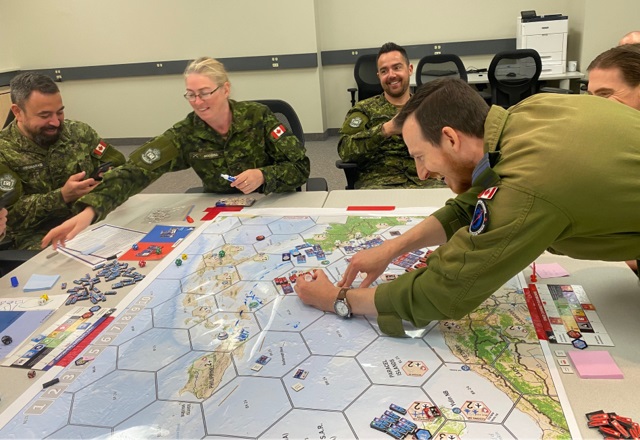Enhancing Military Education: The Canadian Joint Warfare Centre’s Collaboration with The Canadian Forces College
July 18, 2024 – Defence Stories

Caption
Joint Command Staff Program Students playing the "Thrilla Near Manilla" scenario, launching large anti-ship missile salvoes at enemy fleets.
Introduction
For several years, the Canadian Joint Warfare Centre (CJWC) has been fostering collaboration with the Canadian Forces College (CFC) to enhance learning within the Joint Command Staff Program (JCSP). Their joint effort aims to introduce wargaming and wargame thinking as complimentary components to the traditional curriculum.
The Role of Wargaming
Wargaming transcends mere simulation. It’s a tool that allows military professionals to explore complex scenarios, test hypotheses, and refine decision-making processes. By creating a “safe to fail” environment, wargaming enables analysis of competitive human decision-making, fostering agility and adaptability.
Exercises BLUE and RED MONSOON
The aim of the MONSOON series of wargames was to enable JCSP students to develop an understanding of modern military operations.
Design objectives were:
- Design and deliver a land-focused wargame: Achieved via the Operational Wargame System (OWS) custom-designed scenario "Raid in Rezekne";
- Design and deliver a maritime focused wargame: Achieved via the OWS custom-modified scenario "Thrilla near Manilla";
- Design and deliver an air/strike focused wargame: Achieved through the OWS custom-designed scenario "Strike in Svalbard"; and
- Design and deliver a joint Operational / Strategic wargame: Achieved through the OWS modified scenario "Norwegian Nightmare – Baltic Bluff".
The execution of these games occurred from 22 to 29 May, marking a significant milestone in the CJWC-CFC partnership.
Educating the Next Generation of CAF Leaders
The collaboration between the CJWC and CFC aims to modernize aspects of military education. By integrating wargaming into the curriculum, they empower the next generation of CAF leaders with critical thinking skills, adaptability, and a deeper understanding of operational complexities.
Challenges
- Game Design: Crafting effective wargames requires meticulous design. Balancing realism, complexity, and playability is a perpetual challenge. The CJWC wargaming team must continually refine game mechanics to ensure meaningful outcomes.
- Outcome Assessment: Determining success criteria and evaluating wargame outcomes can be intricate. Metrics like mission accomplishment, casualty rates, or strategic impact need careful consideration.
- Ensuring Success: Wargames should yield actionable insights. The CJWC wargaming team faces the challenge of translating game results into tangible improvements in doctrine, training, or operational planning.
Opportunities
- Interdisciplinary Learning: Wargaming bridges history, strategy, psychology, and technology. Leveraging this interdisciplinary approach enhances holistic understanding among participants.
- Scenario Customization: Tailoring scenarios to real-world events or hypothetical situations enriches the learning experience. Complex geopolitical challenges foster analytical growth.
- Ethical Dilemmas: Wargaming introduces ethical quandaries—balancing military objectives with humanitarian concerns. Addressing these dilemmas prepares leaders for real-world complexities.
Conclusion
By continuing to foster collaboration between CFC and CJWC, future iterations of JCSP courses will benefit from creative and bespoke wargame scenarios built to enhance course curricula and objectives.